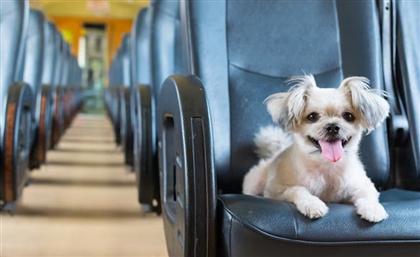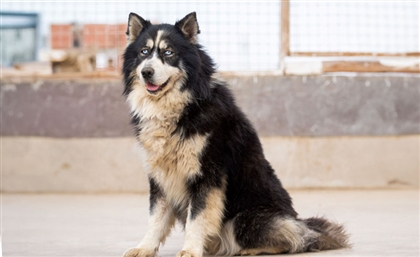For the Love of Strays
With thousands, if not millions, of stray animals on Egypt's streets, Eihab Boraie finds Anubis Bastet Adoptions - a revolutionary organisation that rescues and rehomes needy animals, helping strays find better lives abroad.
Egypt’s cold-hearted, poverty stricken streets make up a cruel theatre of life that is more abused and downtrodden than anything described in a Dickens or Mahfouz novel. Describing Egypt with words like cold, cruel, dirty, poor, abused is often stigmatising and can lead to hatred towards the author, however it needs to be said that the way Egyptians treat stray animals on the street is inhumane, unacceptable, and unthinkable by global moral and ethical standards. Originally a defeatist on the matter, I thought nothing could be done, but through my wife’s determination and Anubis Bastet Adoptions - caretakers of Egypt’s forgotten kittens and puppies - it was starting to seem possible.
When I brought my Canadian wife to live with me in Egypt, I knew the adjustment would be tough, alienating and heartbreaking but hoped the hardships would be worth it for the opportunity to travel the world. As lifelong animal lovers and pet owners, the hardest part in adapting to Cairo wasn’t power outages, gas shortages or instability but rather the daily birth and often horrific death of street animals in almost every nook and cranny. In our first month, our neighbourhood strays gave birth to eight very cute puppies. Unable to look at these cuties as vermin or pests, we decided to do our best to keep them alive providing food and water in front of our apartment. Unfortunately, in less than half a year, all the puppies and parents would die, each in their own equally tragic way, ranging from being run over to being eaten by other starving dogs. Unclear if any survived or not, my wife had seen enough and began scouring the internet for solutions and shelters, which lead her to Anubis Bastet Adoptions (ABA).
The Anubis and Bastet I refer to are not the ancient gods of Egyptian mythology, but rather an organisation who realised that the only way to help the strays of Egypt is to get them out of here and into the homes of would-be adopters or temporary shelters across the world. Excited and encouraged by the idea of an organisation that is attempting the slow but steady exodus of animals from Egypt, I decided to get in touch and learn more about the inspiring group and the concerned animal lovers behind it.

ABA was officially founded on the 13th of September 2013, after it became very clear that there was a desperate need for a portal solely dedicated to the adoption of Egyptian animals. The idea came to founder and director Emily Wallace when she was “living in Cairo for five years and witnessed the immense hardships of Egyptian animals first hand. I helped with various animal charities and personally rescued lots of sick, motherless and injured animals off the street, and treated them in my flat. However, I noticed that, although I could rescue and treat the animals until they were fit to be adopted, I could very rarely find them homes, as Egyptian adopters were simply not interested in 'balady' animals, or animals with any kind of special needs.”

This desire for pure bred is just another sad systemic example of Egyptians looking to prove their social status, shamelessly owning pets for their price tag instead of their companionship. It is for this reason that many avoid adopting balady dogs, and why ABA seeks shelters abroad opposed to within the country. Sending them to an Egyptian shelter where they will likely live the rest of their lives forgotten in a cage in a desert isn’t quite salvation. However, sending them abroad can prove to be costly. According to Wallace “adopters pay some of the fees, basically whatever they can afford. And to help with the rest, we run targeted online fund-raising campaigns for those specific animals and spread them via social media. Americans and British people tend to be the biggest donors, but more and more Egyptians are now donating too.”

What began as one woman’s mission quickly blossomed into a small global network of foreign and Egyptian animal lovers picking up the call and doing whatever they can to help the safe transfer of mistreated strays out of Egypt. “ABA took off immediately and has so far directly helped 50 animals travel abroad to forever homes in Europe and North America, while indirectly helping many more. ABA now has an adoption coordinator in Germany, Farida El-Badry, who helps network animal adoptions and arranges the flights. We also have coordinators in Cairo, who help on the ground, organising the paperwork, transport and carriers for the animals. Each pet transport takes a great amount of detailed planning and teamwork,” explains Wallace, adding that “we are a small organisation, and feel that we work better that way. And by remaining small, we don't lose the personal touch. Our motto is 'Helping Egyptian animals, one at a time.'”

Inspired by their work, my wife decided to reach out and see if she could help bring back animals on her recent summer trip to Canada. Within two weeks, ABA was able to collect all the money and paperwork required, without troubling my wife for anything. All that was required on her behalf was the willingness to accompany three rescued dogs on their flight to Canada. Three ABA volunteers met us at the airport with three dogs: Faith, Patsy and Bella. In the matter of minutes, my wife was given all the paperwork and money needed and checked-in the rescued canines with relative ease. Once she arrived in Canada, the process only took an hour and a half to get her and her precious cargo out of the airport, where they were met by anxious employees of the shelters that would be their new temporary homes until adopted.

The experience was both rewarding and gratifying, and took only the little effort to make a serious impact on the lives of these battered pups. If you have ever felt like you wanted to help but didn’t know how, ABA will quickly reply to any queries as they are always looking for volunteers. According to Wallace, “ABA is always on the lookout for flight parents; Egyptians, ex-pats or tourists who can take animals with them on their flights out of Egypt. Often the animals go in the hold of the plane and the passenger doesn't need to do anything different from normal. We are always searching for people travelling from Cairo to the USA, Canada and European destinations, especially Germany, Belgium and France. Within Cairo, we also need volunteers to take pets to vet appointments (all animals are vet-checked in the week before travel) and to drive them to the airport. ABA also needs donations, as we cannot do what we do without fund-raising.”

It is an absolute shame that we live in a culture that is so far from being able to provide safe homes for the millions of animals who have as much claim to this land as we do. It’s even sadder that instead of addressing the issue and setting up an effective spaying/neutering programme to deal with exponential rise of homeless animals, we are ignoring them. “It would be a dream if Egyptians learned to love their animals more, rather than insisting on buying and breeding foreign breeds, some of whom are not even suited to the climate of Egypt. I love Egyptian cats and dogs, and would never choose another kind. They are very special; loving, loyal, intelligent, funny and playful.”
In only 10 months since they started, Emily Wallace and the ABA have proven that anyone can make a difference, and if you too are an animal lover concerned with the plight of the street animals in Egypt, volunteering at this inspiring organisation is your chance to help them find a loving home.
Find out more about ABA and how you can get involved on their official Facebook page here.
- Previous Article The Final El Fusion
- Next Article Saudi Outrage Over Hair on News
























